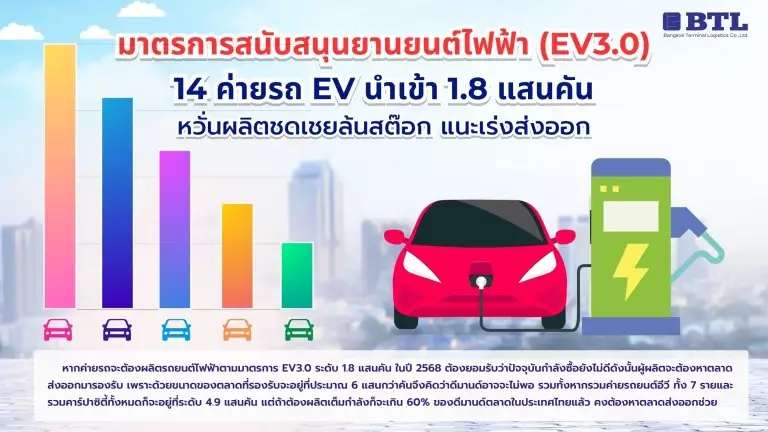EV 3.0 Incentives: 14 Automakers Import 180,000 EVs, Risk of Overproduction Calls for Export Acceleration
July, 18 2024

A key condition requires local production at a 1:1 ratio, meaning that for every imported EV, an equivalent number must be manufactured domestically.
Import & Production Estimates Under EV 3.0
The Excise Department projects that 14 automakers will participate, with total imports expected to reach 185,029 units by 2025:
- 2022-2023 imports: 84,195 units
- 2024 imports: 66,448 units
- 2025 imports: 34,386 units
Top 5 EV Importers (2022-2025):
- BYD (Rever Automotive Co., Ltd.) – 77,274 units
- Neta Auto (Thailand) Co., Ltd. – 40,837 units
- MG Sales (Thailand) & SAIC Motor-CP Co., Ltd. – 27,186 units
- Great Wall Motor (Thailand) Co., Ltd. – 24,225 units
- EV Primus Co., Ltd. (Wuling & Volt brands) – 8,493 units
Compulsory Local Production Starts in 2024
Manufacturers that must begin compensatory production in 2024 (based on 2022-2023 imports) include:
- BYD – 38,637 units
- Neta Auto – 16,337 units
- MG Sales & SAIC Motor-CP – 16,191 units
- Great Wall Motor – 9,645 units
- EV Primus – 1,597 units
The Excise Department has already disbursed subsidies for 40,000 EVs, with 35,000 more applications pending. It plans to request 7 billion THB in additional funding from the Cabinet.
Challenges & Overproduction Concerns
- 2024: 1:1 production-import ratio
- 2025: 1.5:1 production-import ratio
- Projected 2025 local EV production: 100,000 units
Automakers must meet production targets by 2025 or face penalties, including repayment of subsidies plus a fine equal to twice the refunded tax amount.
Ekniti Nitithanprapas, Director-General of the Excise Department, stated that 2024 marks the first year of local EV production. The industry expects to produce 80,000–90,000 units and begin exporting Thai-made EVs, positioning Thailand as an EV manufacturing hub alongside its existing internal combustion engine (ICE) vehicle production.
Industry Perspectives & Export Solutions
Krisada Uttamote, President of the Electric Vehicle Association of Thailand (EVAT), warns that with 180,000 EVs required for production under EV 3.0 by 2025, domestic demand may not be sufficient. He advises manufacturers to seek export markets to prevent inventory surplus.
Current market capacity is estimated at 600,000+ units, but Thailand's combined EV production capacity (all seven participating automakers) exceeds 490,000 units, potentially oversupplying the market by over 60%.
Automakers may adopt phased production plans, clearing existing stock before ramping up local production, while considering various market strategies.
EV Market Growth & Supply Chain Challenges
Surapong Paisitpatanapong, Vice Chairman of the Federation of Thai Industries (FTI), highlighted that:
- May 2024 BEV registrations: 8,166 units (+14.5% YoY)
- H1 2024 BEV registrations: 43,921 units (+31.64% YoY)
- May 2024 HEV registrations: 10,789 units (+34.64% YoY)
- H1 2024 HEV registrations: 59,317 units (+53.48% YoY)
- May 2024 PHEV registrations: 704 units (-31.32% YoY)
- H1 2024 PHEV registrations: 4,053 units (-22.01% YoY)
Thailand’s EV stock now exceeds 175,316 units, growing by 168% YoY.
Battery supply chain issues remain a concern, as BYD is currently the only automaker with a fully operational local plant. Other manufacturers need to develop supply chains and ensure production readiness before scaling up EV manufacturing for domestic and export markets.